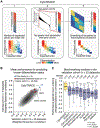Single-cell transcriptional diversity is a hallmark of developmental potential
- PMID: 31974247
- PMCID: PMC7694873
- DOI: 10.1126/science.aax0249
Single-cell transcriptional diversity is a hallmark of developmental potential
Abstract
Single-cell RNA sequencing (scRNA-seq) is a powerful approach for reconstructing cellular differentiation trajectories. However, inferring both the state and direction of differentiation is challenging. Here, we demonstrate a simple, yet robust, determinant of developmental potential-the number of expressed genes per cell-and leverage this measure of transcriptional diversity to develop a computational framework (CytoTRACE) for predicting differentiation states from scRNA-seq data. When applied to diverse tissue types and organisms, CytoTRACE outperformed previous methods and nearly 19,000 annotated gene sets for resolving 52 experimentally determined developmental trajectories. Additionally, it facilitated the identification of quiescent stem cells and revealed genes that contribute to breast tumorigenesis. This study thus establishes a key RNA-based feature of developmental potential and a platform for delineation of cellular hierarchies.
Copyright © 2020 The Authors, some rights reserved; exclusive licensee American Association for the Advancement of Science. No claim to original U.S. Government Works.
Conflict of interest statement
Figures




Comment in
-
Transcriptomics of developmental fate.Nat Rev Genet. 2020 Apr;21(4):203. doi: 10.1038/s41576-020-0221-4. Nat Rev Genet. 2020. PMID: 32086496 No abstract available.
References
-
- Visvader JE, Clevers H, Tissue-specific designs of stem cell hierarchies. Nat Cell Biol 18, 349–355 (2016). - PubMed
-
- Kretzschmar K, Watt FM, Lineage tracing. Cell 148, 33–45 (2012). - PubMed
-
- Sulston JE, Schierenberg E, White JG, Thomson JN, The embryonic cell lineage of the nematode Caenorhabditis elegans. Dev Biol 100, 64–119 (1983). - PubMed
-
- Kester L, van Oudenaarden A, Single-Cell Transcriptomics Meets Lineage Tracing. Cell Stem Cell 23, 166–179 (2018). - PubMed
Publication types
MeSH terms
Substances
Grants and funding
LinkOut - more resources
Full Text Sources
Other Literature Sources
Medical
Molecular Biology Databases

